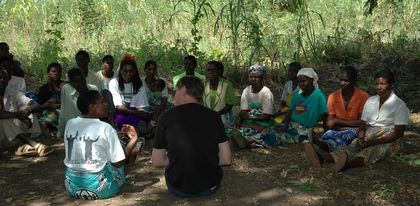Diversity of communication and youth empowerment in Tanzania
This project component is grounded in Tanzania and led by Datius Rweyemamu, Lecturer, University of Dar es Salaam, Department of Sociology (Tanzania).
With the increased production, consumption of, and exposure to, mass media, young people have information at their disposal that is likely to influence their responses to pro-youth health initiatives in terms of policy dialogue, broad public debates, sexuality and leadership. However, a majority of young people are still trapped within the confines of power imbalances in almost all spheres of development.
This project component will comprise three levels of inquiry: media and social processes; diversity of communication and democratic culture; and the impact of civic culture on adolescent empowerment or disempowerment.
Media and social processes
The first level of inquiry will be to examine the extent to which the media resolves or exacerbates the tension between power as a static top-down view and power as something fluid, contestable and individually negotiated. Specifically, this level will look at the extent to which media (both traditional and modern) shapes, and is shaped by, young people’s agency, diversity, resistance and empowerment toward the attainment of adolescent sexual and reproductive health. This part of the study will thus be cross-sectional, considering the media as a sector rather than being FEMINA specific. Complementarily, the policies that enhance the processes of shaping and reshaping young people’s agency, resistance and empowerment will be analyzed.
Diversity of communication and democratic culture
The second level of inquiry will be to explore a claimed cultural shift among development policy makers and donors, from control of information to a culture of partnership and mutual learning. The shift, we claim, is also toward a culture of respect for different ways of looking, expressing and living in diversity of communication. Little is known about how participatory and inclusive approaches to media such as those applied by FEMINA HIP in Tanzania are likely to influence this claimed cultural shift. Who exercises this cultural shift? What techniques of control are employed? What role do young people play in resisting or facilitating the processes of cultural shift? What role do the differences in power and control play in this process?
Impact of civic culture on adolescent empowerment/disempowerment
The third level of inquiry will be connected to the third project component grounded in Tanzania by working within the same community settings and undertaking a quantitative assessment of media and communication practices amongst youth.
Methodology
The study is both longitudinal and cross-sectional, involving multi-sites within Tanzania. Data will be collected from a cohort of unmarried young people (ages 15 to 24) who have been residents of target urban and rural communities for four years. This age range is targeted because it encompasses profound changes in the lives of young people. A series of quotas will be used to generate the sample, with community membership, sex and age as the main criteria.
For expected outputs and time frame, see MEDIeA’s project description.
